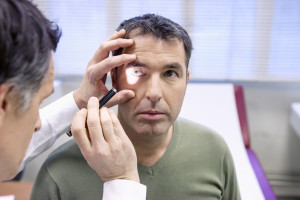Eye Health
by Dr. Faryal Ali, BS, MLS, (ASCP)
Having normal vision allows us to see things without wearing corrective glasses or contact lenses. Most Americans by the age of 41 years wear bifocals. Why? Because most eat a poor diet, or do not know what to eat in order to preserve their vision. Some Americans may prefer to not wear glasses, so what should they be eating? If food, proper nutrition, is to be our medicine we must learn what our needs are in order to retain normal uncorrected vision and good health.
The macula, the most important part of the retina in our eyes, requires certain nutrients, vitamins and minerals, in order to function well. If nutrients are not present or in correct balance, severe vision loss may occur.The macula has a high concentration of a yellow pigment called lutein, which can be measured in blood samples. Also, macular degeneration may occur because of deficiencies of Vitamin E, Zinc and Vitamin C. All of these are routinely measured at our Riordan Clinic BioCenter Laboratory.
Different structures and functions of the eye require different nutrients. For example, the lens, found behind the pupil in the anterior chamber of the eye, needs Vitamin C, at six times its normal blood plasma level. A special pump maintains this high level of Vitamin C in the eye, required as a part of cataract prevention.
Other nutrients vital to maximal eye function are Vitamin A and Zinc, which are essential for the prevention of night blindness and loss of accommodation (focus). Good circulation, critical in the transport of nutrients to the eyes, and could be compromised by heavy metals. Another common eye disorder is glaucoma, which can cause blindness. This can be prevented by eating a balanced diet, emphasizing fresh vegetables, nuts and Omega-3 fatty acids. The nerve layer of the retina is also very important for eye health. It works as a blue light filter in the central retina. Yellow carotenoid pigment, known as beta carotene, can also act as a filter and prolong eye health.
Now you know some of the most important vitamins, minerals and fatty acids necessary for eye health. Eye conditions, like cataracts, glaucoma, inability to focus and loss of central vision can usually be prevented by good nutrition, especially by the consumption of spinach, eggs, asparagus, garlic, onions, carrots, cantaloupes, yams, corn and leafy greens or vegetables When vision suffers, the critical nutrients, Lutein, Beta Carotene, Vitamin A, Vitamin C, Zinc, Selenium and fatty acids can be measured in the blood, enabling your physician to correct out-of-range results, which may correct your vision problems. Our BioCenter Laboratory, which has specialized in nutrient testing since 1975, is certified by the U.S. Government. In our library at the Riordan Clinic, we have a great selection of books and tapes by Dr. Riordan and other staff physicians on eye and vision health. Please visit our website, RiordanClinic.org, for more details.





